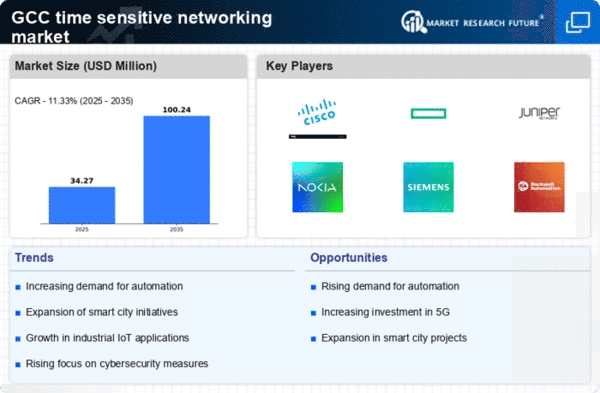Emergence of 5G Technology
The advent of 5G technology is set to revolutionize the time sensitive-networking market in the GCC. With its promise of ultra-low latency and high-speed connectivity, 5G is expected to enable a new era of applications that require immediate data transmission. The GCC countries are at the forefront of 5G deployment, with investments exceeding $1 billion in infrastructure development. This technological advancement is likely to enhance various sectors, including healthcare, automotive, and entertainment, by providing the necessary bandwidth for time sensitive applications. As 5G networks become more widespread, the demand for time sensitive networking solutions that can leverage this technology will likely increase, further propelling the market's growth.
Growth in Industrial Automation
The time sensitive-networking market is poised for growth due to the increasing adoption of industrial automation technologies in the GCC. As industries strive for greater efficiency and reduced operational costs, the integration of automated systems becomes paramount. The market for industrial automation in the region is expected to reach $10 billion by 2026, with a significant portion attributed to time sensitive networking solutions. These solutions facilitate seamless communication between machines, enabling faster response times and improved production rates. The shift towards automation is not only transforming traditional manufacturing processes but also driving the demand for reliable and efficient networking technologies, thereby enhancing the overall landscape of the time sensitive-networking market.
Expansion of Smart City Initiatives
The time sensitive-networking market is significantly influenced by the expansion of smart city initiatives across the GCC. Governments are investing heavily in infrastructure that supports smart technologies, which require robust networking solutions to function effectively. For instance, the UAE has allocated over $1 billion for smart city projects, emphasizing the need for efficient data communication. These initiatives aim to improve urban living through enhanced transportation systems, energy management, and public safety. As smart cities evolve, the demand for time sensitive networking solutions that can handle the high volume of data generated will likely increase. This trend not only fosters innovation but also positions the time sensitive-networking market as a critical component in the development of future urban environments.
Increased Focus on Digital Transformation
The time sensitive-networking market is benefiting from the increased focus on digital transformation initiatives across various sectors in the GCC. Organizations are recognizing the importance of adopting advanced technologies to remain competitive in a rapidly evolving landscape. This shift towards digitalization is driving the need for efficient networking solutions that can support high-speed data transfer and real-time communication. As businesses invest in digital tools and platforms, the demand for time sensitive networking solutions is expected to rise. The GCC region is witnessing a significant investment in digital infrastructure, with projections indicating a growth rate of 12% in the digital transformation market over the next few years. This trend underscores the critical role of time sensitive networking in enabling successful digital transformation efforts.
Rising Demand for Real-Time Data Processing
The time sensitive-networking market is experiencing a notable surge in demand for real-time data processing capabilities. Industries such as manufacturing, transportation, and telecommunications are increasingly reliant on instantaneous data transmission to enhance operational efficiency. In the GCC region, the market for real-time data processing is projected to grow at a CAGR of approximately 15% over the next five years. This growth is driven by the need for timely decision-making and improved responsiveness to market changes. As organizations seek to optimize their processes, the integration of time sensitive networking solutions becomes essential. The ability to process data in real-time not only enhances productivity but also supports the development of advanced applications, thereby propelling the time sensitive-networking market forward.
















